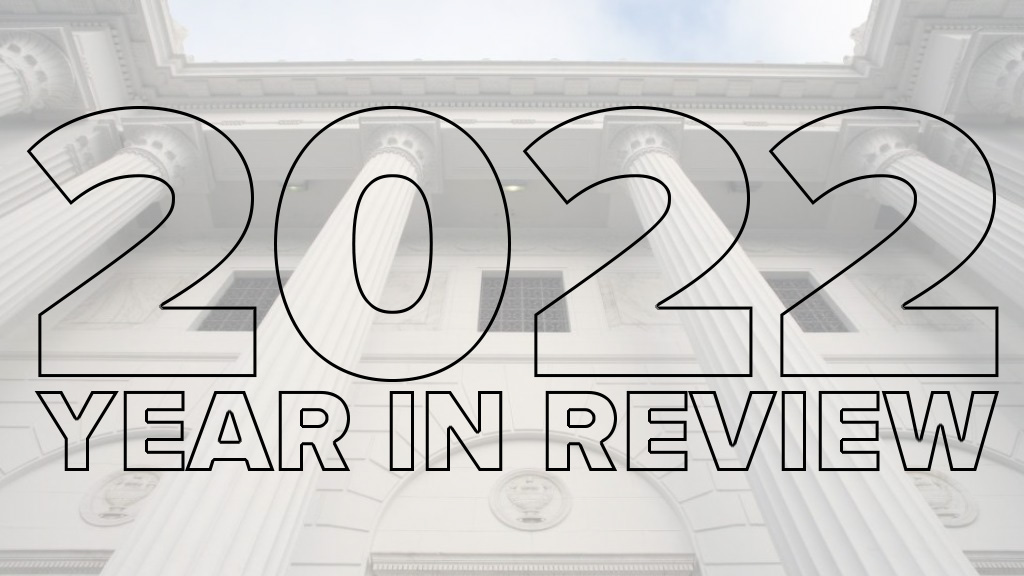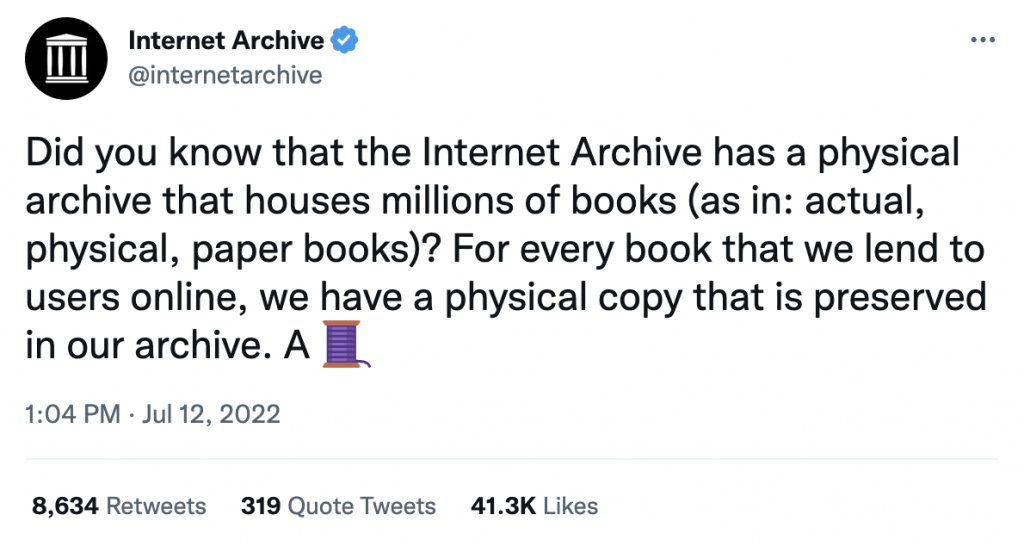
The Internet Archive launched the Empowering Libraries campaign in 2020 to defend equal access to library services for all. Since then, threats to libraries have only grown, so our fight continues. As 2022 draws to a close, here’s a look back through some of our library’s milestones and accomplishments over the year.
In the news
- When the war in Ukraine started, volunteers began using the Wayback Machine and other online tools to preserve Ukrainian websites and digital collections. The effort, Saving Ukrainian Cultural Heritage Online (SUCHO), now has more than 1,500 volunteers working to preserve more than 5,000 web sites and 50TB of data.
- Watch a compelling story about SUCHO from CBS News featuring Quinn Dombrowski, one of the project leaders from Stanford University, and Mark Graham, director of the Wayback Machine.
- In May, we partnered with Better World Books on a book drive supporting Ukrainian scholars. BWB customers were able to donate $1 at checkout to acquire books cited in the Ukrainian-language Wikipedia for the Internet Archive to preserve, digitize, and link to citations in Wikipedia.
- In October, we introduced Democracy’s Library, a free, open, online compendium of government research and publications from around the world. We hosted an in-person celebration that highlighted the critical importance of free and open access to government publications, and have continued framing out what Democracy’s Library is and why it’s necessary.
- Internet Archive Canada opened its new headquarters in Vancouver, BC, alongside the Association of Canadian Archivists 2022 Conference.
- More than 1,000 authors have spoken out on behalf of libraries, demanding that publishers and trade associations put the digital rights of librarians, readers, and authors ahead of shareholder profits.
- In a tumultuous year on social media, Internet Archive has added a Mastodon server. Why? We need a game with many winners, not just a few powerful players.
- In an OpEd for TIME, Brewster Kahle, founder and digital librarian of the Internet Archive, warned, “the instability occasioned by Twitter’s change in ownership has revealed an underlying instability in our digital information ecosystem.”
The internet reacts to the lawsuit against our library
- On July 7, 2022, the Internet Archive filed a motion for summary judgment, asking a federal judge to rule in our favor and end a radical lawsuit, filed by four major publishing companies, that aims to criminalize library lending. Check out the Hachette v. Internet Archive page at EFF for all filings and resources.
- We hosted a press conference on July 8 about the lawsuit featuring statements from Brewster Kahle (Internet Archive) and Corynne McSherry (EFF), plus powerful impact statements from medical school librarian Benjamin Saracco and author and editor Tom Scocca.
- Interest in the lawsuit crossed over into mainstream channels following a viral tweet about the filing, which kicked off a lengthy online conversation about library rights, digital lending and digital ownership.
- After a series of standard filings across the summer and early fall, on October 8, Internet Archive filed the final brief in support of our motion for summary judgment, asking the Court to dismiss the lawsuit because our lending program is a fair use.
- What does the lawsuit mean for the future of libraries? Internet Archive’s policy counsel, Peter Routhier, considers how the publishers view libraries based on their filings.
- Check out the Hachette v. Internet Archive page at EFF for all filings and resources.

- One message really resonated online—people were surprised to learn that the Internet Archive has a physical archive that preserves all the physical books we’ve acquired and digitized.
eBooks, #OwnBooks & digital ownership
- 2022 might go down as the year that people started to really understand what it means when libraries & individuals can no longer own content, like when streaming-only content vanishes from media platforms.
- Musician Max Collins wrote in Popula how “owning media is now an act of countercultural defiance,” walking readers through his first-hand example of how the streaming model doesn’t work for artists, only corporations.
- Brewster Kahle published, “Digital Books wear out faster than Physical Books,” countering the notion put forward by publishers that ebooks don’t wear out. In fact, Brewster notes that ebooks require “constant maintenance—reprocessing, reformatting, re-invigorating or they will not be readable or read.”
- Brewster’s post sparked the interest of LA Times business columnist Michael Hiltzik, who expanded on the issues around digital ownership in “Here’s why you can’t ‘own’ your ebooks.”
- To celebrate why it’s important to own books, and to help bring visibility to issues around digital ownership, we launched the participatory #OwnBooks campaign, which invited people to share photos with the oldest book, or most treasured volume, from their personal collection, like this signed copy of The Phantom Tollbooth.
- Author Glyn Moody published his latest book, Walled Culture, as a free ebook that you can download and own, or as a physical book that you can purchase in print.
- More publishers joined the movement to sell—not license—ebooks to libraries, including independent publisher 11:11 Press.
The future of libraries
- In February, we launched Library as Laboratory, a new series exploring the computational use of Internet Archive collections. The series included segments from digital humanities scholars, computational scientists, web archiving professionals and other researchers.
- To help librarians and other information professionals better understand the decentralized web, Internet Archive partnered with the Metropolitan New York Library Council, DWeb, and Library Futures for a six-part series, Imagining a Better Online World: Exploring the Decentralized Web.
- During this year’s National Library Week, we invited readers to Meet the Librarians who work at the Internet Archive, highlighting the new roles our librarians lead in support of our mission, “Universal Access to All Knowledge.”
- Internet Archive joined with Creative Commons, Wikimedia Foundation and others in the Movement for a Better Internet, a collaborative effort to ensure that the internet’s evolution is guided by public interest values.
- Lila Bailey, Internet Archive’s senior policy fellow, and Michael Menna, policy fellow from Stanford University, released their report,”Securing Digital Rights for Libraries: Towards an Affirmative Policy Agenda for a Better Internet,” regarding libraries’ role in shaping the next iteration of the internet.
Milestones
- Dave Hansen, one of the authors of the white paper on controlled digital lending, was named the new executive director of Authors Alliance.
- Carl Malamud received this year’s Internet Archive Hero Award for his lifelong mission to make public information freely available to the public.
- We hosted the first in-person Library Leaders Forum in three years, preceded by a virtual Forum that brought together hundreds of digital library enthusiasts to explore issues related to digital ownership and the future of library collections.
- We hosted a joint webinar with OCLC about our resource sharing pilots, including how to request articles from the Internet Archive via interlibrary loan.
- The Music Library Association made its publications openly available at Internet Archive.
- We began gathering content to support the newly announced Digital Library of Amateur Radio and Communications (DLARC), and then quickly surpassed 25,000 items in the collection.
- DISCMASTER, a new software tool, allows users to search across the contents of the tens of thousands of archived CD-ROMs at the Internet Archive.
- In August we celebrated the 20th anniversary of the Live Music Archive with a historical tour of the effort, which has resulted in hundreds of thousands of live sets available for listening at archive.org.
Donations
- Colgate University donated more than 1.5 million microfiche cards for preservation and digitization, covering topics including Census data, documents from the Department of Education, Congressional testimony, CIA documents, and foreign news translated into English.
- Facing an uncertain future, Hong Kong bookstore owner Albert Wan closed his pro-democracy, independent bookstore and donated the books to the Internet Archive for preservation and digitization.
- Do you have physical collections you’d like to donate to the Internet Archive? Check out our help document.
Book talks
- The Copyright Wars with Peter Baldwin
- Data Cartels with Sarah Lamdan
- Walled Culture with Glyn Moody
- The History of the Computer with Rachel Ignotofsky
- How We Give Now with Lucy Bernholz
- The Library: A Fragile History with Andrew Pettegree and Arthur der Weduwen
- The Catalogue of Shipwrecked Books with Edward Wilson-Lee
- WHOLE EARTH: The Many Lives of Stewart Brand with John Markoff
I am 21 , and I finished 3 University .